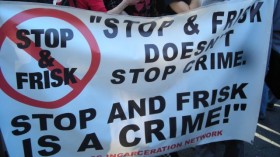The New York City Police Department cannot keep tabs on more than 360,000 people entered into a stop-and-frisk database for subsequent investigation, a state appeals court ruled.
 NYPD Commissioner Ray Kelly says that the personal information on people whom officers detain as part of the controversial stop-and-frisk program “remains there indefinitely, for use in future investigations.”
NYPD Commissioner Ray Kelly says that the personal information on people whom officers detain as part of the controversial stop-and-frisk program “remains there indefinitely, for use in future investigations.”
But the New York Civil Liberties Union helped two implicated citizens strike back with a 2010 class action.
Lead plaintiff Clive Lino was 29 years old and worked at a student residential facility in Harlem when police stopped him getting out of his car in the Bronx. Officers issued two summonses, both of which were dismissed.
Daryl Khan, the other named plaintiff, was a 35-year-old freelance journalist living in Clinton Hill who was pulled while riding his bike. His two summonses were also dismissed.
Lino and Khan say that their inclusion in the database turned a criminal accusation into the basis for permanent suspicion, violating their civil rights and municipal law.
A New York County Supreme Court judge booted the suit in 2011, finding no proof that the database injured those whose names it stores.
The first department of the state Appellate Division reversed Thursday.
“Indeed, it makes little sense for plaintiffs to have to wait until their job applications are in the mail or they are about to appear for job interviews before they have standing to bring a cause of action against the effect of the unsealed records,” the unsigned ruling states. “In any event, well-established precedent supports the view that there can be an injury under the statute even where a plaintiff merely fears the prospect of an adverse effect before his record is ever unlawfully disclosed.”
New York must seal the records to remove the “stigma” of having been branded by “unsustained allegations,” according the decision.
The five-judge panel also revived Khan’s false-arrest and tort claims, which they said the lower court improperly dismissed.
NYCLU Executive Director Donna Lieberman hailed the ruling.
“With this victory, innocent New Yorkers who are the victims of unjustified police stops will no longer suffer the further injustice of having their personal information stored indefinitely in an NYPD database,” Lieberman said in a statement. “The court’s ruling finally clears the names of more than 360,000 innocent people whose only crime was that they were stopped and frisked by NYPD officers.”
NYC Law Department attorney Celeste Koeleveld said the city disagrees with the decision, but that it “was merely a procedural issue, not a ruling on the merits.”
“The case now returns to the trial court to address the plaintiffs’ claims, which are merely allegations – and we believe without substance,” Koeleveld added.
Further Information:
- Case Document [9 page pdf] : CASE DECISION, Appellate Division, First Department: Clive Lino, et al., Plaintiffs-Appellants, The v. City of New York, et al., Defendants-Respondents. The Community Service Society of New York,The Bronx Defenders, The Center for Community Alternatives, The Legal Action Center, The Legal Aid Society, MFY Legal Services, Youth Represent, The New York County Lawyers’ Association, and the Fortune Society, Amici Curiae.
Article republished from Courthouse News









